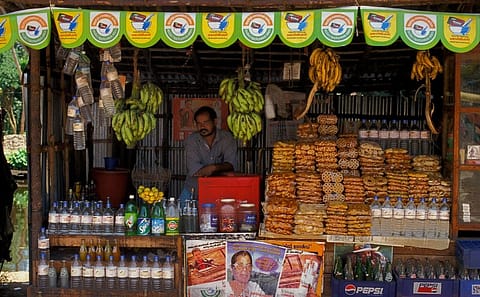Kirana stores struggle as Q-commerce gains ground
Business in kirana stores have dropped by 25-30% compared to pre-Covid levels, driven by the growing popularity of q-commerce platforms

Kirana stores, the backbone of India’s retail sector, are facing an existential crisis as the rapid rise of quick commerce (q-commerce) reshapes the consumer goods market. These small, neighbourhood stores have seen a sharp decline in sales, with the All-India Consumer Products Distribution Association (AICDF) warning that without swift regulatory intervention, up to 25-30% of these outlets could shut down in the coming years.
Kiranas hit hard amid q-commerce surge
India is home to approximately 30 million kirana stores, which have traditionally catered to the daily needs of consumers across the country. However, the rise of e-commerce and q-commerce has been devastating for many of these small retailers. Business in kirana stores have dropped by 25-30% compared to pre-Covid levels, driven by the growing popularity of q-commerce platforms like Zomato’s Blinkit, Swiggy Instamart, and Dunzo, which offer superior user experiences at discounted prices.
“As per our checks, distributors on the ground are unable to recover dues from kirana stores due to the negative impact on kiranas by digital platforms; kirana stores are sitting with high levels of inventory and distributors are unable to receive money on time,” says Karan Taurani of Elara Capital.
The problem is most acute in metro cities, where q-commerce firms have rapidly scaled up, but the real danger lies in their potential expansion into non-metro markets. The report highlights that these markets, previously the stronghold of kirana stores, are now ripe for disruption. The AICDF fears that if q-commerce continues to grow unchecked, 20-25% of kirana stores could be forced to shut down.
To protect kirana stores, the AICDF has lobbied the Indian government to implement a Minimum Sales Price (MSP) as part of the Digital Competition Bill. The AICDF argues that the aggressive discounting practices of q-commerce platforms are unsustainable for small retailers and threaten the viability of their businesses.
“The expansion and adoption of q-commerce in metro cities has already severely impacted kirana stores, and further expansion into non-metro regions could be catastrophic,” states the AICDF in its appeal to the commerce ministry.
Recommended Stories
The proposed MSP would prevent q-commerce platforms from selling products below a certain threshold, effectively capping the discounts they offer. This move, according to the AICDF, is essential for maintaining a level playing field between traditional kirana stores and digital platforms.
“…, the implementation of MSP in a worst-case scenario may have a mild negative impact on q-commerce segment growth rates in the medium term, as the latter is a more convenience-led approach and not completely dependent on discounts,” says Taurani.
Despite the challenges posed to traditional retailers, the q-commerce market in India is booming. Currently, q-commerce accounts for 10-12% of the fast-moving consumer goods (FMCG) market, compared to just 4-5% before the pandemic. The sector has been growing at an annual rate of 116%, with leaders like Blinkit poised to sustain growth rates of 70-80% year-on-year until 2030, particularly if they can successfully penetrate non-metro markets.
The report suggests that q-commerce platforms will likely continue discounting in non-metro areas to build consumer habits, as they did in metro cities. However, profitability in these markets remains a key challenge. "There is a high likelihood of initial success in non-metro markets, but consistent revenue generation per store remains a key monitorable," says the report.
(INR CR)
Risks for q-commerce
While q-commerce offers a strong growth opportunity, it is not without risks. Any regulation that caps discounts, such as the MSP proposed by AICDF, could significantly impact the sector's growth. For q-commerce companies, user experience and convenience are major drivers, but discounts still play a crucial role in attracting customers.
The impulse buying behaviour on q-commerce platforms is largely driven by discounts, especially for direct-to-consumer (D2C) brands. Any regulation on pricing or discounts will negatively affect the growth rates of q-commerce adoption, cautions the report.
“Regulatory hurdles, such as gig worker security and alleged predatory pricing by aggregator companies if implemented could curtail growth rates in the near term, although medium-term prospects remain healthy,” adds Taurani.
While the future of kirana stores hangs in the balance, q-commerce continues its rapid expansion. The sector's growth is undeniable, but meanwhile the pressure on traditional retailers is mounting, and regulatory measures may be necessary to ensure their survival. Whether kirana stores can coexist with this new wave of digital retail or will be pushed to the brink remains to be seen.